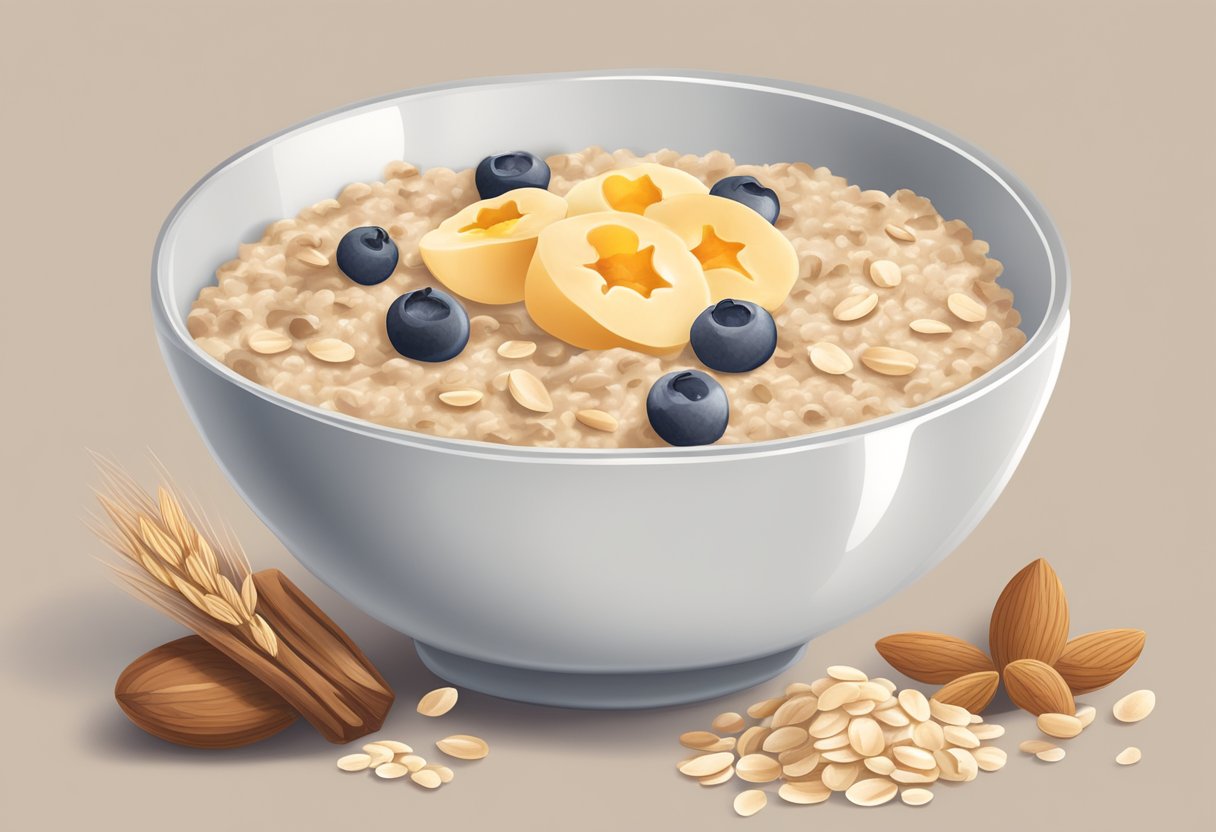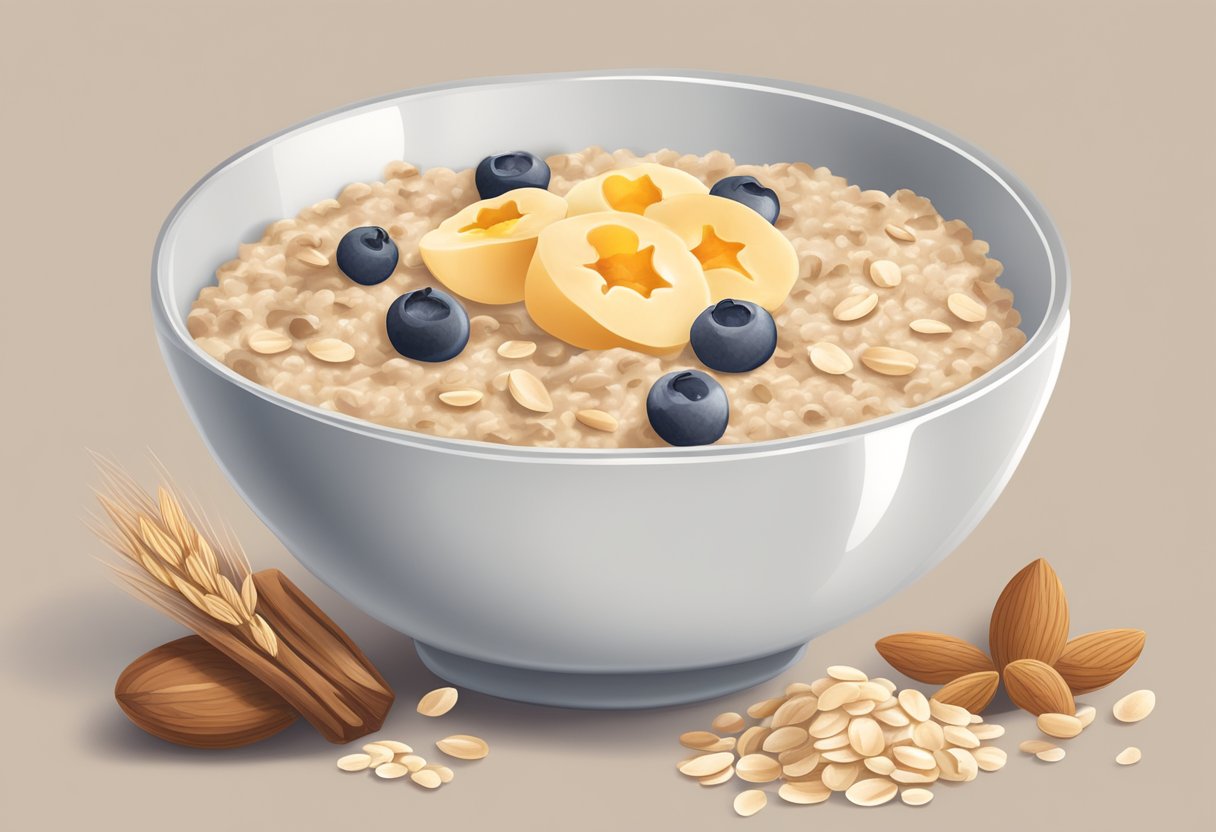Is Oatmeal Keto Friendly? A Clear Answer for Your Diet.

Oatmeal is a popular breakfast food that many people enjoy. However, with the rise of the ketogenic diet, some may wonder if oatmeal is keto-friendly. The ketogenic diet is a high-fat, low-carb diet that aims to put the body into a state of ketosis, where it burns fat for energy instead of carbohydrates.
Oatmeal is a grain that is high in carbohydrates, which makes it a food that is not typically recommended for those following a ketogenic diet. In fact, one cup of cooked oatmeal contains about 27 grams of carbohydrates, which is more than the daily recommended amount for someone following a ketogenic diet. However, there are ways to make oatmeal more keto-friendly, such as by adding low-carb toppings like nuts, seeds, and berries, or by using alternative grains like chia seeds or flaxseed meal.
Overall, whether or not oatmeal is keto-friendly depends on the individual’s specific dietary needs and goals. While oatmeal is not typically recommended for those following a strict ketogenic diet, it can be incorporated in moderation for those who are following a more flexible low-carb diet. It is important to consult with a healthcare professional or registered dietitian to determine the best dietary plan for one’s individual needs.
Understanding Keto Diet
https://www.youtube.com/watch?v=AsLGoU7eQsM&embed=true
The ketogenic diet, commonly known as the keto diet, is a high-fat, low-carbohydrate diet that has gained popularity in recent years. The diet is designed to put the body in a state of ketosis, where it burns fat for energy instead of carbohydrates.
Ketosis occurs when the body’s carbohydrate stores are depleted, and it begins to break down fat for energy. This process produces ketones, which the body can use for fuel. The ketogenic diet typically consists of 70-75% fat, 20-25% protein, and 5-10% carbohydrates.
The keto diet has been shown to be effective for weight loss, reducing inflammation, and improving blood sugar control in people with diabetes. However, it is not recommended for everyone, especially those with liver or pancreatic disease.
It is essential to note that not all high-fat, low-carbohydrate diets are ketogenic. The key difference between the keto diet and other low-carb diets is the amount of carbohydrates consumed. In a low-carb diet, the body may still rely on carbohydrates for energy, whereas in a keto diet, the body is forced to use fat for fuel.
While oatmeal is a healthy breakfast option, it is not suitable for the keto diet due to its high carbohydrate content. One cup of cooked oatmeal contains approximately 27 grams of carbohydrates, which is too high for most people following the keto diet.
In conclusion, the keto diet is a high-fat, low-carbohydrate diet designed to put the body in a state of ketosis. While it has been shown to be effective for weight loss and improving blood sugar control, it is not recommended for everyone. Oatmeal is not suitable for the keto diet due to its high carbohydrate content.
Oatmeal and Carbohydrates
https://www.youtube.com/watch?v=pVi9DctWe4A&embed=true
Oatmeal is a popular breakfast food that is often considered healthy due to its high fiber content. However, its carbohydrate content has led to questions about whether it is keto-friendly.
One cup of cooked oatmeal contains around 27 grams of carbohydrates, with 4 grams of fiber. This means that the net carb content is around 23 grams per cup. While this may fit into some people’s daily carb limit on a keto diet, it may be too high for others.
It’s important to note that the glycemic index of oatmeal is relatively high, meaning it can cause a spike in blood sugar levels. This can be problematic for those on a keto diet, as it can kick them out of ketosis.
Despite this, there are ways to make oatmeal more keto-friendly. For example, using steel-cut oats instead of rolled oats can lower the glycemic index and net carb content. Additionally, adding healthy fats such as nuts or coconut oil can help balance out the carb content and keep you feeling full for longer.
Overall, while oatmeal may not be the best option for those strictly following a keto diet, it can still be enjoyed in moderation with some modifications.
Is Oatmeal Keto-Friendly
Oatmeal is a popular breakfast food that is known for its health benefits. However, for those following a keto diet, oatmeal may not be the best choice due to its high carbohydrate content.
Keto-friendly oatmeal, also known as “noatmeal,” is a low-carb alternative that is made with ingredients like flaxseed, chia seeds, coconut flour, and almond flour. This type of oatmeal substitute is a good option for those on a keto diet who still want to enjoy a warm and comforting breakfast.
Regular oatmeal contains around 27 grams of carbs per 100 grams, while noatmeal typically contains around 5-10 grams of carbs per serving. This makes noatmeal a much better option for those on a keto diet who need to limit their carbohydrate intake.
It’s important to note that not all oatmeal substitutes are keto-friendly. Some may contain hidden carbs or added sugars that can kick you out of ketosis. It’s important to read ingredient labels carefully and choose oatmeal substitutes that are low in carbs and free from added sugars.
In conclusion, while regular oatmeal may not be keto-friendly, there are low-carb alternatives like noatmeal that can be enjoyed as part of a keto diet. It’s important to choose oatmeal substitutes that are low in carbs and free from added sugars to stay in ketosis and achieve your health goals.
Nutritional Value of Oatmeal
Oatmeal is a popular breakfast option that has been around for centuries. It is made from ground oats and is often consumed with milk or water. Oatmeal is a good source of fiber, protein, vitamins, and minerals. In this section, we will explore the nutritional value of oatmeal.
Fiber
Oatmeal is a good source of fiber, which is important for digestive health. One cup of cooked oatmeal contains 4 grams of fiber. Fiber helps to regulate bowel movements and can lower cholesterol levels.
Protein
Oatmeal is also a good source of protein. One cup of cooked oatmeal contains 6 grams of protein. Protein is important for building and repairing tissues in the body.
Calories
Oatmeal is a low-calorie food, making it a good option for weight management. One cup of cooked oatmeal contains approximately 150 calories.
Vitamins
Oatmeal is a good source of vitamins, particularly vitamin B1 (thiamin) and vitamin B6. These vitamins are important for energy production and brain function.
Minerals
Oatmeal is a good source of minerals, including iron, potassium, zinc, magnesium, and calcium. These minerals are important for various bodily functions, such as muscle and nerve function, bone health, and immune system function.
Antioxidants
Oatmeal contains antioxidants, which are important for protecting cells from damage caused by free radicals. The antioxidants in oatmeal include avenanthramides, which are unique to oats.
Cholesterol
Oatmeal is known to help lower cholesterol levels due to its high fiber content. The soluble fiber in oatmeal can bind to cholesterol in the digestive tract and prevent it from being absorbed into the bloodstream.
Overall, oatmeal is a nutritious food that can provide numerous health benefits. It is a good source of fiber, protein, vitamins, and minerals, making it a great addition to a healthy diet.
Benefits of Oatmeal on Health
Oatmeal is a popular breakfast food that is known for its numerous health benefits. Here are some of the ways oatmeal can positively impact your health:
Weight Loss
Oatmeal is a great food for those looking to lose weight. It is high in fiber, which can help you feel full for longer periods of time. Additionally, oatmeal has a low glycemic index, which means it won’t cause a spike in blood sugar levels that could lead to hunger cravings.
Blood Sugar Levels
Oatmeal can also help regulate blood sugar levels. The high fiber content in oatmeal can slow down the absorption of sugar into the bloodstream, which can help prevent spikes in blood sugar.
Heart Disease
Oatmeal is also good for heart health. The soluble fiber in oatmeal can help lower LDL cholesterol levels, which is the “bad” cholesterol that can increase the risk of heart disease. Additionally, oatmeal contains antioxidants called avenanthramides, which have been shown to reduce inflammation and improve blood flow.
Cancer
Oatmeal may also have cancer-fighting properties. The beta-glucan fiber in oatmeal has been shown to stimulate the immune system and help the body fight off cancer cells.
Blood Pressure
Oatmeal can also help lower blood pressure. The high fiber content in oatmeal can help improve blood flow and reduce inflammation, which can lead to lower blood pressure.
Inflammation
Finally, oatmeal has anti-inflammatory properties. The avenanthramides in oatmeal have been shown to reduce inflammation in the body, which can help prevent chronic diseases like heart disease, diabetes, and cancer.
Overall, oatmeal is a nutritious food that can provide numerous health benefits. Incorporating oatmeal into your diet can help you maintain a healthy weight, regulate blood sugar levels, reduce the risk of heart disease and cancer, lower blood pressure, and reduce inflammation.
Keto-Friendly Oatmeal Alternatives
For those following a keto diet, oatmeal may not be the best option due to its high carbohydrate content. Fortunately, there are several keto-friendly alternatives that can be used in place of oatmeal.
One option is to use seeds such as chia seeds, flaxseed, and hemp hearts. These seeds are high in fiber and healthy fats, making them a great option for those on a keto diet. They can be mixed with almond or coconut milk and left to sit for a few minutes to create a pudding-like consistency.
Another alternative is to use almond or coconut flour to make low-carb oatmeal. These flours can be mixed with water or almond milk and cooked on the stove to create a porridge-like consistency. Adding in flaxseed meal can also increase the fiber content of the dish.
For those who prefer a whole-grain option, there are several low-carb alternatives available such as konjac flour and lupin flour. These flours are high in fiber and protein, making them a great option for those on a keto diet.
Overall, there are several keto-friendly alternatives to oatmeal that can be used to create a satisfying and nutritious breakfast. By using seeds, low-carb flours, and whole-grain alternatives, those on a keto diet can still enjoy a warm and filling breakfast without compromising their dietary goals.
Keto-Friendly Oatmeal Recipes

While oatmeal is generally considered a healthy breakfast option, it is not typically keto-friendly due to its high carbohydrate content. However, with a few modifications and creative ingredient substitutions, oatmeal can be made keto-friendly and still be delicious.
One popular keto oatmeal recipe involves using either steel-cut oats or oat groats and cooking them with almond milk or unsweetened coconut milk. Adding in a scoop of protein powder can also help increase the protein content of the dish. Toppings such as nuts, nut butter, coconut flakes, and berries can be added for flavor and texture.
For those who prefer instant oats, there are keto-friendly options available that are lower in carbohydrates and higher in dietary fiber. These can be cooked with either water or a keto-friendly milk alternative such as almond milk or coconut milk.
Another tasty option is a cinnamon roll oatmeal made with rolled oats, cinnamon, vanilla extract, and coconut cream. Toppings such as butter, nuts, and berries can be added for extra flavor and nutrition.
Meal prep is also an option for those who want to incorporate keto oatmeal into their meal plan. Oatmeal can be made ahead of time and stored in the fridge for a quick and easy breakfast option throughout the week.
It is important to note that while oatmeal can be made keto-friendly, it should still be consumed in moderation as grains are not typically part of a strict keto diet. Adding collagen or omega-3 fatty acids can also help balance out the insulin response from the carbohydrates in the oats.
Overall, with a little creativity and knowledge of keto-friendly ingredients, oatmeal can be a satisfying and nutritious addition to a keto diet.
Conclusion
In conclusion, oatmeal can be a part of a keto diet if consumed in moderation and combined with other keto-friendly foods. While oatmeal is not inherently keto-friendly due to its high carbohydrate content, it can be made more keto-friendly by opting for steel-cut or rolled oats, which have a lower glycemic index and are less likely to cause a spike in blood sugar levels.
When consuming oatmeal on a keto diet, it’s important to keep portion sizes small and to pair it with high-fat foods such as nuts, seeds, and coconut oil to balance out the macronutrient ratios. It’s also important to be mindful of any added sugars or sweeteners in oatmeal products, as these can quickly add up and kick you out of ketosis.
Overall, while oatmeal may not be the most ideal food for a keto diet, it can still be enjoyed in moderation as part of a balanced and varied diet. As with any dietary change, it’s important to consult with a healthcare professional before making any significant changes to your diet.








Leave a Reply